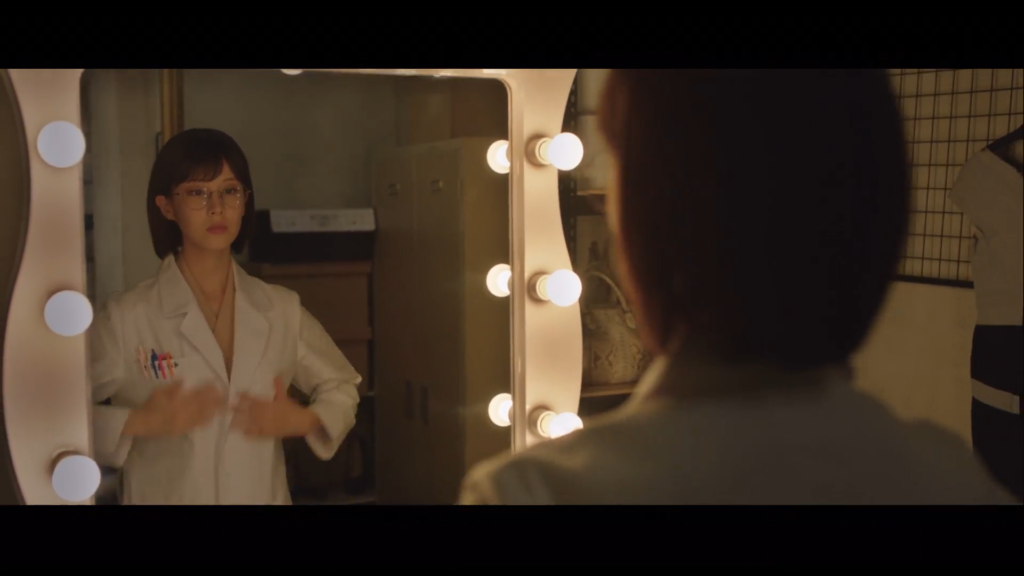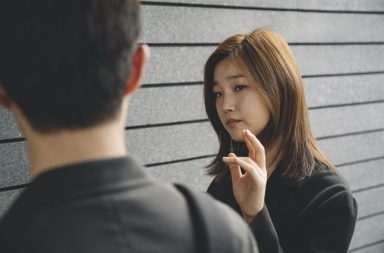
In Private Lives which concluded recently, Cha Joo-eun (SNSD’s Seohyun) is a suave con woman who weasels her way through any situation to get to her goal. Similarly, the archetype of the con woman takes centre stage in drama series like Mad Dog and Leverage, and films such as Parasite and The Thieves by surprising viewers with new ways to deceive and the different characters that the con woman transforms into. Other than simply being an enthralling figure to watch, many iterations of the con woman in Korean dramas and films embody female empowerment. This article will discuss the treatments of memorable con women characters. A small disclaimer: this article does not intend to glorify crime, but rather discuss the symbolic empowerment that con women are given in films and series.
This article contains spoilers from The Thieves, Parasite and Private Lives.
Taking a trip down memory lane to 2012, The Thieves is a heist movie that features a co-ed band of swindlers, with capable, deceitful female con-women Chewingum (Kim Hae-sook), Yenicall (Jun Ji-hyun) and Pepsee (Kim Hye-soo). As a genre that is typically male-dominated (think the American heist Ocean’s film series that has only seen an all-female heist group in recent years’ Ocean’s 8), The Thieves‘ inclusion of three female swindlers is a significant step in female representation. This is not to say that female representation matters because “girls can be swindlers too”, but rather, because heist characters are associated with charisma and manipulation, granting them full knowledge (and control) of the situation over their rich victims; they possess a form of dominance and hence agency over society’s influential figures. In other words, capable female con-women in films are women of agency.

This is seen in The Thieves, and is especially significant in the film’s portrayal of three con women. Having different personalities and thieving skills, the film humanises them, setting these characters apart from token, sexualised female characters usually seen in action movies (such as the notorious Bond girl). For example, one of Yenicall’s role in the group is to initiate the first contact with their target, often wearing tight-fitting and revealing dresses to distract men and gain what she needs. Yet, she does not only exist as eye candy in the group, as she pulls her weight by being the runner, utilising wire contraptions to scale buildings to enter high-security places. Most significantly, she is the only one in the group other than the leader who was able to get her hands on the Tear of Sun diamond, the ultimate prize the group was aiming for, by pre-empting the betrayal of Popeye (Lee Jung-jae), the leader of their initial team. Hence, The Thieves’ portrayal of the con woman as a capable character with agency that is able to manipulate men, especially in the case of Yenicall, places women on par with their male counterparts in the team, a significant contribution to women representation in the heist genre.
Another popular con-woman in recent years is the Oscar-winning Parasite‘s Ki-jung (Park So-dam) who disguises as a prestigious art teacher as part of her family’s scheme to infiltrate the wealthy Parks. Ki-jung’s ability to confidently assume her role as an Illinois State University art graduate with a bit of internet research on art therapy allows her to successfully clinch the job. Not only is she a key player in this “heist” operation, she is also an opportunistic mastermind who plants an opportunity for her father to infiltrate the household as a driver by strategically leaving her undergarments in the car. Similar to The Thieves, Ki-jung as a con woman places her on par with her brother, Ki-woo (played by Choi Woo-sik), having them both playing an equally key role of strategising and executing the deceit, positing her as an equally powerful con who gains an upper hand on the wealthy, rather than a token female con artist.
Other than gender empowerment, Ki-jung is able to transgress her class with her ability to deceive. She not only secures a stable source of income as a highly paid teacher, but also gains the identity of someone from the upper-class with an educated background and privileged upbringing, gaining access to the comfort of luxury and privacy, as symbolized by the mansion which she freely uses when the Parks are away. Her alias, Jessica, whom she is called by the Parks, as well as her family, symbolizes the collective external recognition of her as a new person of the upper-class, solidifying her persona along with her new manner of speech, dressing, and lifestyle.

As Ki-woo accurately comments,
You fit in here. This rich house suits you. Not like us. … She was lying back in the tub, watching TV. Like she’s lived here for years.
Yet, she is not completely free from her identity as someone from the lower-class. A quick comparison in the way she talks about art therapy in front of the Parks and behind the Parks reveals the two jarring personas she embodies. When speaking to Mrs Park, she describes Da-song’s painting using jargons and a gentle tone: “The lower-right region of a painting is called the ‘schizophrenia zone’. Psychotic symptoms often reveal themselves there.” Her language posits her as a sophisticated expert, in contrast to the manner she describes the painting again when she is with her familym saying, “I googled ‘art therapy’ and ad-libbed the rest. Then suddenly she’s weeping. Crazy bitch.”
Hence, rather than completely taking on the identity of the rich, Ki-jung’s ability to transform into Jessica grants her access to another identity while retaining her old one, and to luxury which she would otherwise not have access to without swindling. Her death at the end marks the impossibility to transgress class on one’s own effort, ultimately showcasing that Ki-jung did not have a firm grasp of her new identity all along, and that her new identity was but a temporary one.
Coming full circle, Private Lives’ Cha Joo-eun is the epitome of female empowerment — classy, independent, a driving force, badass, and at the same time, vulnerable, sympathetic and human.
Her identity as a con woman grants her the power and freedom to become anyone in society in order to fulfil her goal of revenge. In Episode 1 alone, a small montage teases us of her versatility as she undergoes many identities — a doctor, an air stewardess, a laboratory staff worker, a baseball cheerleader, a pilot, a blind woman, a taxi driver, a fangirl, a burglar, and so on. While she engages the help of her mother’s friend, Han Son (played by Tae Won-seok), she is still the active mastermind who drives her plot of revenge along rather than being swayed by others mindlessly. Her swindling skills hence enable her to carve out an alternative route to revenge when the law fails to deal the same justice that is done to her father, to the main instigator, Jeong Bok-gi (played by Kim Hyo-jin).
Agency is a strong characteristic that defines Joo-eun throughout the drama. Even when the plot twist is revealed that she is being duped by Jeong Bok-gi, and later on, lied to by her fiancé Lee Jeong-hwan (played by Ko Gyung-pyo), she seeks revenge and pursues the truth instead of staying as a passive, miserable victim. She is not a damsel in distress that needs saving, and the fact that she is able to successfully track down Kim Jae-wook — the prime mastermind behind her father’s scape-goat imprisonment — all by herself even when Jeong Bok-gi was unable to, proves that she is equally capable of getting what she wants. The significance of this feat is heightened by the fact that Jeong-hwan himself had tracked Jae-wook’s mansion, placing her on par with Jeong-hwan rather than a victim of his impersonation.
Notably, while she has been saved an increasing number of times by Jeong-hwan and Han Son in the later episodes, she still manages to pull her weight by putting their plan of investigating the sinister GK into action by going undercover multiple times, rather than being a passive character in need of saving.
The portrayal of the con woman in dramas and films as versatile, strong and manipulative thus carries a message of female empowerment. These con women utilize their charms to gain the trust of their victims, and in the process gain dominance over the people more powerful than them, be it of the other gender or of the upper class, as well as the agency to choose a life that is different from their usually poverty-stricken one.
(Images via CJ Entertainment, JTBC, SHOWBOX)



